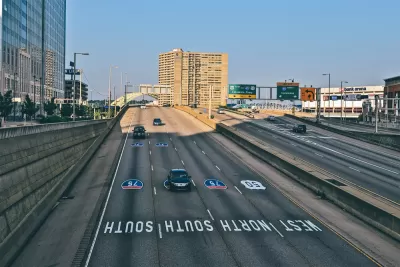Cincinnati's recently launched, $109 million capital investment plan will leave the vision laid out by the city's 2010 Bicycle Transportation Plan in the dust.

Randy Simes reports on the commencement of a six-year, $109 million Capital Acceleration Plan in Cincinnati, which represents a strategic policy shift and "a large infusion of money into road repair." Adds Simes: "The new focus on preventive maintenance is particularly noticeable as it represents an eight-fold increase in spending on that front."
Simes also details the types of project funded by the program, including $10.6 million for street rehabilitation and $4 million for preventive maintenance in the next year, as well as improvements for 940 center-line miles of streets over the next six years.
The article is not entirely focused on celebrating the program as a win for the city and for transportation infrastructure. Rather, Simes elaborates on the plan as a missed opportunity for bike infrastructure. Despite the city of Cincinnati’s Bicycle Transportation Plan "[calling] for incremental improvements to the city’s bike network as road resurfacing projects take place," the city "has fallen woefully behind on the implementation of the recommendations made in the Bicycle Transportation Plan." In fact, according to Simes, the priorities of mayor John Cranley are focused on off-street recreational bike trails, rather than on-street bike infrastructure.
FULL STORY: Cincinnati’s $109M Capital Acceleration Plan Ignores Adopted Bike Policy

Planetizen Federal Action Tracker
A weekly monitor of how Trump’s orders and actions are impacting planners and planning in America.

Congressman Proposes Bill to Rename DC Metro “Trump Train”
The Make Autorail Great Again Act would withhold federal funding to the system until the Washington Metropolitan Area Transit Authority (WMATA), rebrands as the Washington Metropolitan Authority for Greater Access (WMAGA).

DARTSpace Platform Streamlines Dallas TOD Application Process
The Dallas transit agency hopes a shorter permitting timeline will boost transit-oriented development around rail stations.

Renters Now Outnumber Homeowners in Over 200 US Suburbs
High housing costs in city centers and the new-found flexibility offered by remote work are pushing more renters to suburban areas.

The Tiny, Adorable $7,000 Car Turning Japan Onto EVs
The single seat Mibot charges from a regular plug as quickly as an iPad, and is about half the price of an average EV.

Supreme Court Ruling in Pipeline Case Guts Federal Environmental Law
The decision limits the scope of a federal law that mandates extensive environmental impact reviews of energy, infrastructure, and transportation projects.
Urban Design for Planners 1: Software Tools
This six-course series explores essential urban design concepts using open source software and equips planners with the tools they need to participate fully in the urban design process.
Planning for Universal Design
Learn the tools for implementing Universal Design in planning regulations.
Municipality of Princeton
Roanoke Valley-Alleghany Regional Commission
City of Mt Shasta
City of Camden Redevelopment Agency
City of Astoria
Transportation Research & Education Center (TREC) at Portland State University
US High Speed Rail Association
City of Camden Redevelopment Agency
Municipality of Princeton (NJ)





























